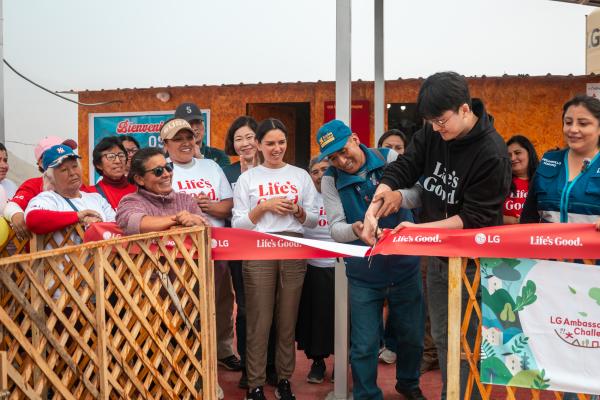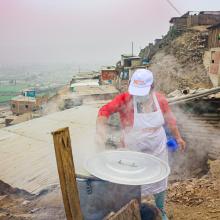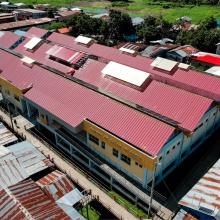In the upper part of Río Seco, in Carabayllo, the “OSB 4 de diciembre” communal cooking pot looks unrecognizable today. After winning the LG Ambassador Challenge award, Socios En Salud (SES) completed the execution of a new space that now has a fully equipped module, two water tanks and a solar panel system that will improve sanitation and food supply for 75 people - some 35 families - including those in vulnerable situations.
”It’s like a complete turnaround that has occurred. What we used to have with our precarious little pot, today we have a pot that is really going to support us both in terms of health and care, since we have so many implements that they have given us: the module, the refrigerator, the oven, the blender…. Before we did not have a blender, we had to use a fulling pan. It is really a big impact,” says Janeth Ninahuanca, president of the common pot.
One of the most urgent needs was access to electricity. “We used to rely on provisional energy, and the payment was too high. Now, with the solar panels, we are going to save between 200 and 250 soles a month, which will allow us to support our members in health emergencies,” Ninahuanca explains. Water supply was also a challenge: “Here in Río Seco, when the electricity goes out, there is no signal and we cannot locate the water carrier. If it doesn’t come, we don’t cook. Now, with these big tanks, we can always count on water.”
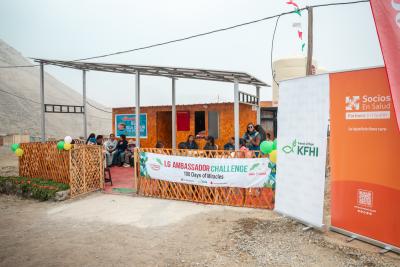
Así luce la nueva olla común «4 de diciembre», ubicada en la localidad Río Seco, Carabayllo, que alimenta alrededor de 35 familias todos los días.
Foto de Julio López / SES
Common pots: the urgency that persists after the pandemic
During the toughest days of the COVID-19 pandemic, it was the common pots that kept thousands of families from going hungry. In Carabayllo, more than 130 of these community organizations - almost always led by women - fed their neighborhoods tirelessly, managing donations, cooking in the streets and facing mass unemployment without resources. Today, although the virus no longer dominates the headlines, the need is still there. The precariousness has not gone away.
Genaro Anco, head of SES’s Social Protection Program (PPS), knows this reality up close. “The common pots are self-managed, they don’t have capital like restaurants. They live from day to day. If you ask, they will tell you that they don’t eat meat like we do. The nutritional quality is very low, and the cost of water and gas hits them every day,” he says.
In addition to the lack of food, infrastructure problems are constant. Water does not come directly: it is deposited in low areas and is brought up in buckets or hoses with motors to the premises. Electricity is shared from a single meter for the entire neighborhood. The lack of adequate refrigeration causes many foods to be lost, generating health risks, especially for children and the elderly.
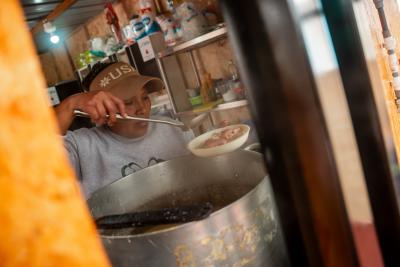
Janeth Ninahuanca, presidenta de la olla común «4 de diciembre», sirve seco de pato, frijoles y arroz para celebrar la inauguración de un espacio que le permitirá a su comunidad tener una mejor calidad de vida.
Foto de Julio López / SES
Against this scenario, SES’s proposal was clear: it is not just a matter of donating equipment, but of transforming the way these cooking pots operate. To that end, they proposed an integrated solution that would reduce energy costs and improve food quality.
The project - dubbed “100 Days of Happiness” by LG - included the installation of solar panels that provide continuous, free energy to the common cooking pot. This allows for the efficient operation of a refrigerator with freezer, an industrial blender and other equipment needed to safely preserve and prepare food. Two new water tanks with greater capacity were also installed and the infrastructure of the premises was improved to provide a dignified space, with a roof and chairs, where families can eat.
“We have implemented more water capacity. Before they had a capacity of 1,200 liters per week and now we implemented one of 5,000 liters per week. That is a difference. The key for us here has been accompaniment,” says Anco.
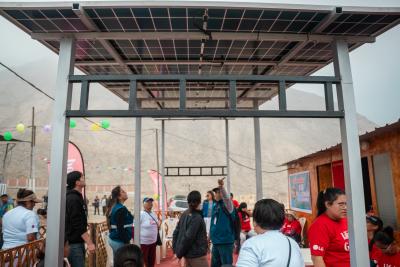
El sistema de paneles solares instalado en la olla común «4 de diciembre» permite que tengan luz eléctrica continua y gratuita. Así, ahorran más de 200 soles mensuales que podrán destinar a ahorros o para cubrir alguna urgencia.
Foto de Julio López / SES
A real commitment to sustainable change
For LG Peru, this type of alliance is essential to carry forward its “life is good” message. “This project is four years old in Peru, although LG Ambassador Challenge is carried out globally in countries in Africa, for example,” explains Laura Soplín, assistant manager of brand marketing at LG Peru. “This year we chose Socios En Salud because we saw that their proposal was sustainable over time and that the community was organized, with a president and clear functions. That guarantees that the change will last.”
Soplín stresses that the needs survey was key. “We saw that water does not arrive continuously, that better storage is needed. Also that electricity is limited and expensive. That’s why we included solar panels and adapted LG appliances. Our philosophy is that life is good, and we believe it can be good for the most vulnerable people as well.”
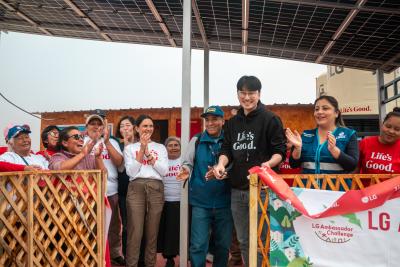
La alianza entre empresa privada, organización social y comunidad ha sido clave para transformar la realidad de esta olla común en Río Seco.
Foto de Julio López / SES
With the common pot already inaugurated, Janeth Ninahuanca stresses that many common pots in the highlands of Carabayllo face the same difficulties as hers. For that reason, she makes a call: “I invite private companies and institutions to join this project that Socios En Salud and LG have been doing.”
The joy in the community is palpable. “My neighbors don’t want to go home, they want to stay in the pot (laughs). Before, we used to wash crouching, cowering, and now we have decent facilities,” comments the president of the common pot.
With this implementation, the “OSB 4 de diciembre” common pot becomes an example of how collaboration between community, NGO and private enterprise can transform realities and improve the quality of life in areas where the lack of basic services is a daily barrier.
